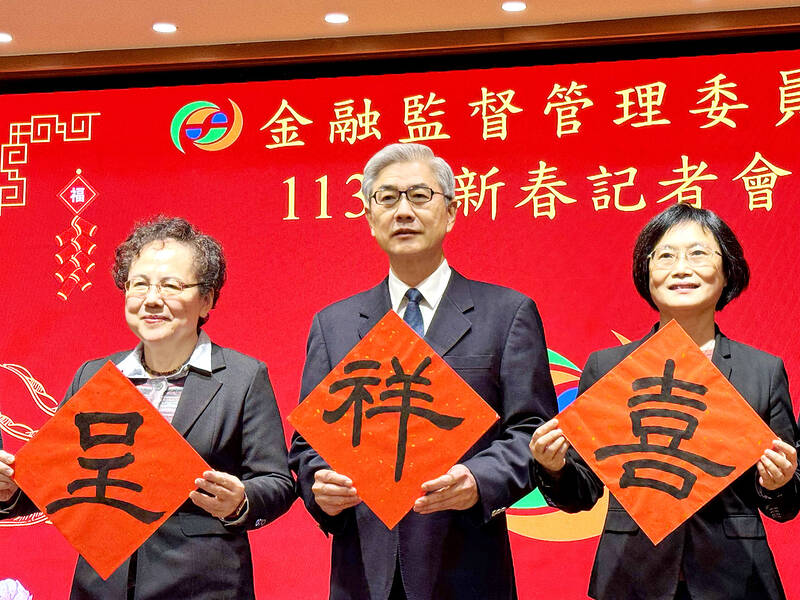Local financial institutions, including banks, insurance companies, securities and futures brokerages, and investment trusts, last year saw aggregate profits soar to their second-highest in history, despite headwinds faced by life insurers in the final two months of the year, the Financial Supervisory Commission (FSC) said yesterday.
Their combined pretax profit totaled NT$703.6 billion (US$22.58 billion), up 46.71 percent from NT$479.6 billion a year earlier, the commission’s data showed.
Financial institutions posted record profits of NT$935.55 billion in 2021, the data showed.

Photo: Kelson Wang, Taipei Times
Banks were the largest contributor to last year’s profit growth, reporting record pretax profits of NT$505.7 billion, up 17.03 percent from NT$432.1 billion in 2022, thanks to rising currency swap income, a capital market recovery, and double-digit percentage growth in fee income for wealth management and credit card businesses, the commission said.
Securities and futures brokerages and investment trusts followed with a combined pretax profit of NT$99.8 billion, a 50.98 percent increase from NT$66.1 billion the previous year, buoyed by a stock market boom, it said.
Insurance companies posted a lower-than-expected pretax profit of NT$98.1 billion for last year, as life insurers sustained foreign-exchange losses amid the appreciation of the New Taiwan dollar against the US dollar in the November-to-December period, it said.
However, insurance companies’ bottom line last year improved greatly from the previous year, when they registered a combined loss of NT$18.6 billion, it said.
FSC Chairman Thomas Huang (黃天牧) said he is optimistic about the sector’s prospects this year.
While the financial industry is resilient, companies should be cautious about market, credit and liquidity risks, as well as challenges from false information and corporate governance, he told a news conference in New Taipei City.
The commission, which celebrates its 20th anniversary this year, hopes financial institutions would further promote innovation and diversification in financial products without sacrificing financial stability, Huang said.
The FSC will assist the industry in upgrading and moving toward net zero carbon emissions and sustainable development, he added.
To improve odd-lot trading opportunities and efficiency on the Taiwan Stock Exchange (TWSE) and the over-the-counter Taipei Exchange, the commission plans to shorten the matching interval of intraday odd-lot trading from one minute to five seconds by the end of this year, Securities and Futures Bureau Director-General Sam Chang (張振山) told the news conference.
The intraday odd-lot trading system was first implemented in October 2020 to attract small-capital investors.
The commission has requested that the TWSE and the Taipei Exchange revise odd-lot trading regulations and promote activities among securities firms and investors to achieve inclusive finance, Chang said.

SEMICONDUCTORS: The German laser and plasma generator company will expand its local services as its specialized offerings support Taiwan’s semiconductor industries Trumpf SE + Co KG, a global leader in supplying laser technology and plasma generators used in chip production, is expanding its investments in Taiwan in an effort to deeply integrate into the global semiconductor supply chain in the pursuit of growth. The company, headquartered in Ditzingen, Germany, has invested significantly in a newly inaugurated regional technical center for plasma generators in Taoyuan, its latest expansion in Taiwan after being engaged in various industries for more than 25 years. The center, the first of its kind Trumpf built outside Germany, aims to serve customers from Taiwan, Japan, Southeast Asia and South Korea,

Nvidia Corp chief executive officer Jensen Huang (黃仁勳) on Monday introduced the company’s latest supercomputer platform, featuring six new chips made by Taiwan Semiconductor Manufacturing Co (TSMC, 台積電), saying that it is now “in full production.” “If Vera Rubin is going to be in time for this year, it must be in production by now, and so, today I can tell you that Vera Rubin is in full production,” Huang said during his keynote speech at CES in Las Vegas. The rollout of six concurrent chips for Vera Rubin — the company’s next-generation artificial intelligence (AI) computing platform — marks a strategic

Gasoline and diesel prices at domestic fuel stations are to fall NT$0.2 per liter this week, down for a second consecutive week, CPC Corp, Taiwan (台灣中油) and Formosa Petrochemical Corp (台塑石化) announced yesterday. Effective today, gasoline prices at CPC and Formosa stations are to drop to NT$26.4, NT$27.9 and NT$29.9 per liter for 92, 95 and 98-octane unleaded gasoline respectively, the companies said in separate statements. The price of premium diesel is to fall to NT$24.8 per liter at CPC stations and NT$24.6 at Formosa pumps, they said. The price adjustments came even as international crude oil prices rose last week, as traders

Taiwan Semiconductor Manufacturing Co (TSMC, 台積電), which supplies advanced chips to Nvidia Corp and Apple Inc, yesterday reported NT$1.046 trillion (US$33.1 billion) in revenue for last quarter, driven by constantly strong demand for artificial intelligence (AI) chips, falling in the upper end of its forecast. Based on TSMC’s financial guidance, revenue would expand about 22 percent sequentially to the range from US$32.2 billion to US$33.4 billion during the final quarter of 2024, it told investors in October last year. Last year in total, revenue jumped 31.61 percent to NT$3.81 trillion, compared with NT$2.89 trillion generated in the year before, according to